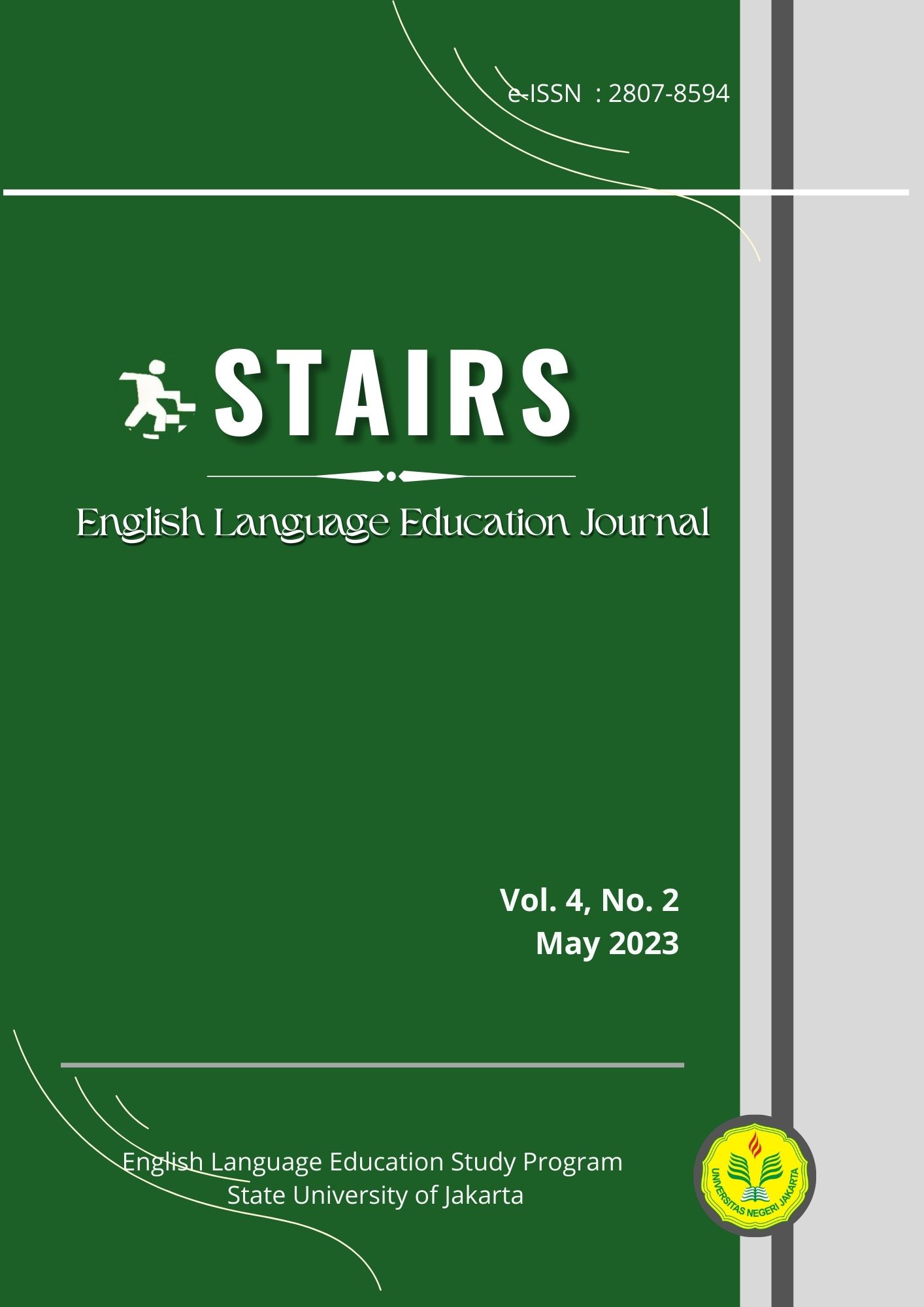Deconstructing Junior High School English Learning Materials based on Microlearning
DOI:
https://doi.org/10.21009/stairs.4.2.4Keywords:
English learning materials, Junior high school, MicrolearningAbstract
Microlearning provides smaller units of a subject adapted using technologies that can be accessed anywhere in a relatively short period, making learning activities more efficient and helping students learn with a specific focus in a brief session. This study aims to analyze the extent of microlearning in the existing junior high school English learning materials and describe the description of junior high school English learning materials based on microlearning. This study uses a qualitative research approach to analyze 25 English learning materials applied and used by junior high school English language teachers in East Jakarta, DKI Jakarta. The study found that most of the junior high school English learning materials are not microlearning-based as they do not fulfill the indicators of microlearning-based English materials for the junior high school level. The procedure of deconstructing 36 basic competencies into microlearning object material includes recognizing the topic and the instructional activities as well as finding suitable micro-learning object materials for the activities. The total 195 microlearning object materials are varied, such as Short videos, Games, PPTs, Quizizz, Interactive e-learning Websites, podcasts, YouTube videos, digital flashcards, and many more. In summary, as the existing English learning materials do not fulfill the indicators, the procedure of deconstructing basic competencies is made to form micro-learning object materials.
References
Alenezi, A. (2020). The Role of e-Learning Materials in Enhancing Teaching and Learning Behaviors. International Journal of Information and Education Technology, 10(1), 48-56.
Allela, M. (2021). Introduction to Microlearning. Commonwealth of Learning (COL)
Allela, M. A., Ogange, B. O., Junaid, M. I., & Charles, P. B. (2020). Effectiveness of Multimodal Microlearning for In-Service Teacher Training. Journal of Learning for Development, 7(3), 384-398.
Arthur-Nyarko, E., Agyei, D. D., & Armah, J. K. (2020). Digitizing Distance Learning Materials: Measuring Students’ Readiness and Intended Challenges. Education and Information Technologies, 25(4), 2987-3002.
Assarroudi, A., Nabavi, F. H., Armat, M. R., Ebadi, A., & Vaismoradi, M. (2018). Directed Qualitative Content Analysis: The Description and Elaboration of Its Underpinning Methods And Data Analysis Process. Journal of Research in Nursing, 23(1), 42–55. https://doi.org/10.1177/1744987117741667
Bannister, J., Neve, M., & Kolanko, C. (2020). Increased Educational Reach through a Microlearning Approach: Can Higher Participation Translate to Improved Outcomes? Journal of European CME, 9(1), 1834761.
Creswell, J. W. (2009). Research Design: Qualitative, Quantitative, and Mixed Methods Approaches. (3rd ed). Los Angeles: Sage.
De Gagne, J. C., Park, H. K., Hall, K., Woodward, A., Yamane, S., & Kim, S. S. (2019). Microlearning in Health Professions Education: A Scoping Review. JMIR Medical Education, 5(2), e13997.
Dingler, T., Weber, D., Pielot, M., Cooper, J., Chang, C. C., & Henze, N. (2017). Language Learning On-the-go: Opportune Moments and Design of Mobile Microlearning Sessions. In Proceedings of the 19th international conference on human-computer interaction with mobile devices and services (pp. 1-12).
Dolasinski, M. J., & Reynolds, J. (2020). Microlearning: A New Learning Model. Journal of Hospitality & Tourism Research, 44(3), 551-561.
Emerson, L. C., & Berge, Z. L. (2018). Microlearning: Knowledge Management Applications and Competency-based Training in the Workplace. UMBC Faculty Collection.
Filipe, H. P., Paton, M., Tipping, J., Schneeweiss, S., & Mack, H. G. (2020). Microlearning to Improve CPD Learning Objectives. The Clinical Teacher, 17(6), 695-699.
Giurgiu, L. (2017). Microlearning: An Evolving eLearning Trend. Scientific Bulletin- Nicolae Balcescu Land Forces Academy, 22(1), 18-23.
Hosseini, H. M., Ejtehadi, A., & Hosseini, M. M. (2020). Flipping Microlearning- Based EFL Classroom to Enhance Learners' Self-Regulation. Language Teaching Research Quarterly, 20, 43-59.
Hug, T. (2010). Mobile Learning as ’Microlearning’: Conceptual Considerations towards Enhancements of Didactic Thinking. International Journal of Mobile and Blended Learning (IJMBL), 2(4), 47-57.
Job, M. A., & Ogalo, H. S. (2012). Microlearning as an Innovative Process of Knowledge Strategy. International journal of scientific & technology research, 1(11), 92-96.
Jomah, O., Masoud, A. K., Kishore, X. P., & Aurelia, S. (2016). Microlearning: A modernized education system. BRAIN. Broad Research in Artificial Intelligence and Neuroscience, 7(1), 103-110.
Lee, Y. M., Jahnke, I., & Austin, L. (2021). Mobile Microlearning Design and Effects on Learning Efficacy and Learner Experience. Educational Technology Research and Development, 69(2), 885-915.
Leong, K., Sung, A., Au, D., & Blanchard, C. (2020). A Review of the Trend of Microlearning. Journal of Work-Applied Management.
Lin, J., Sun, G., Cui, T., Shen, J., Xu, D., Beydoun, G., Yu, P., Pritchard, D., Li, L. & Chen, S. (2020). From Ideal to Reality: Segmentation, Annotation, and Recommendation, The Vital Trajectory of Intelligent Microlearning. World Wide Web, 23(3), 1747-1767.
Mohammed, G. S., Wakil, K., & Nawroly, S. S. (2018). The Effectiveness of Microlearning to Improve Students’ Learning Ability. International Journal of Educational Research Review, 3(3), 32-38.
Nikou, S. A., & Economides, A. A. (2018). Mobile‐based Micro‐learning and Assessment: Impact on Learning Performance and Motivation of High School Students. Journal of Computer Assisted Learning, 34(3), 269-278.
Park, Y., & Kim, Y. (2018). A Design and Development of Micro-learning Content in e-Learning System. International Journal on Advanced Science, Engineering and Information Technology, 8(1), 56-61.
Redondo, R.P.D., Rodríguez, M.C., Escobar, J. J.L, & Vilas, A.F. (2021). Integrating Micro-learning Content in Traditional e-Learning Platforms. Multimedia Tools and Applications, 80(2), 3121-3151.
Sheneman, L. (2021). Microlearning in K-12 Settings. In Microlearning in the Digital Age (pp. 129-138). Routledge.
Susilana, R., Dewi, L., Rullyana, G., Hadiapurwa, A., & Khaerunnisa, N. (2022). Can Microlearning Strategy Assist Students ’Online Learning? Cakrawala Pendidikan: Jurnal Ilmiah Pendidikan, 41(2), 437-451.
Zhang, J., & West, R. E. (2020). Designing Microlearning Instruction for Professional Development Through a Competency-Based Approach. TechTrends, 64(2), 310-318.



